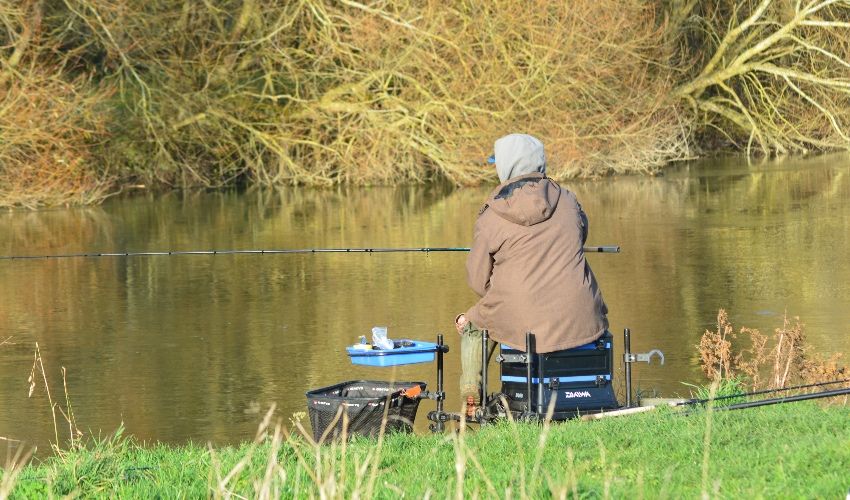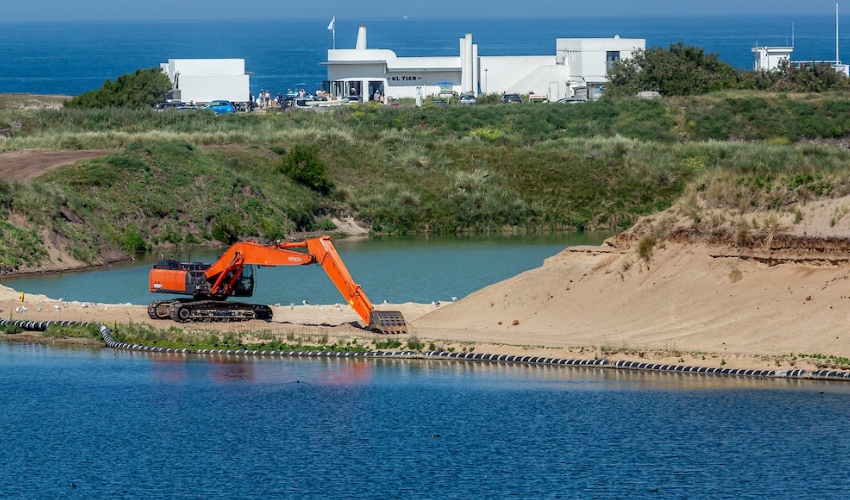


A new investigation into the impact of “forever chemicals” on wild fish in England has found high levels in certain species, which if eaten more than twice a year would exceed recommended EU safety limits - raising questions over the impact on local wildlife.
The research comes around five years after Jersey's Environment Department found high levels of PFAS in a carp in the lake at Simon Sand and Gravel.
PFAS is a family of nearly 12,000 manmade compounds that were used in many household goods because of its ability to resist heat, water and oil.
It was a key ingredient in Teflon, floor tiles and waterproof clothing.
One particular type, called PFOS, was an ingredient of firefighting foam which was sprayed at the Airport until the early 1990s.
It subsequently contaminated ground and surface water in the area.
Because water from boreholes in St. Ouen’s Bay is pumped into Val de La Mare reservoir, PFAS is now found in mains drinking water, although in trace amounts which are well within safety limits. It has also been found in water supplies islandwide.
Several PFAS, including PFOS, have been found to build up in humans and have been linked to health problems including cancer, liver damage, decreased fertility and increased risk of asthma and thyroid disease.
Now, data obtained by Watershed Investigations – a team of journalists writing about water issues – shows contamination in flounder, dab and plaice throughout England’s river and coastal habitats, with the highest readings in the Thames, Mersey and Wyre.
It was reported that an average adult weighing 75 kg who ate a regular-sized portion (170g) of this fish more than once every five months would exceed the recommended safety allowance set by the European Food Safety Authority (EFSA).
There is currently no such set of guidelines in the UK, although a spokesperson for the Department for Environment, Food and Rural Affairs said: “PFAS chemicals are in the environment because they have been used widely in products and are extremely persistent.
“Since the 2000s, we have taken action to increase monitoring and support a ban or highly restrict specific PFAS both domestically and internationally.
“We continue to work with regulators to further understand the risks of PFAS and implement measures to address them.”
PFAS has been found in fish in Jersey, too.
During the summer of 2018, a five-year-old carp was removed from the lake at Simon Sand and Gravel, which is below the western end of the Airport.
Testing by the Environment Department showed that the fish’s liver sample had PFOS levels of 1,180 parts per billion (1,180,000 parts per trillion) and its muscle had 253 ppb (2,530 ppt).
This is considerably higher than the EPSA recommended safety limits.

Pictured: The lake at Simon Sand and Gravel in St. Ouen's Bay has been found to have high levels of PFAS, including in its fish.
The fish was extracted from body of water which is known for being highly contaminated. There is no suggestion that fish and seafood caught in Jersey contain PFAS.
Recent research in the United States has shown that wild-caught, freshwater fish are far more contaminated with toxic PFAS chemicals than those commercially caught in oceans.
Commenting on the recent study in England, Dr David Megson, an environmental chemist at Manchester Metropolitan University, said: “PFAS are a very wide group of chemicals and have a variety of different levels of persistence and toxicity.
“At the moment we don’t have enough information to confirm what is safe and what is posing a problem.
“From looking at most PFAS you would assume they are toxic and bioaccumulative.
"I would prefer us to follow the precautionary principle and only use them where they are proven to be safe and pose no risk to the environment.
“Instead, it seems like we are assuming they are all safe for use and we have to wait decades before we confirm that they have significantly damaged our environment and human health.”
Dr Janine Gray, head of science and policy at WildFish, commented: “The significant concentrations of PFAS found in fish is very concerning but not surprising, and unfortunately just the tip of the chemical iceberg.
“Today, more than 350,000 regulated chemicals are in use. Our waters and their wildlife are exposed to a wide range of these, yet our rivers are currently only routinely checked for 45.
“We must ban all but the most vital uses of PFAS forever chemicals and policy must account for the additive/synergistic effects of chemical mixtures on aquatic life.”
The Government of Jersey has sponsored a blood-testing programme for residents who lived in the ‘plume area’ of contamination in St Ouen’s Bay and the Pont Marquet area of St. Brelade.
Every one of the 78 islanders tested was found to have PFAS in their blood, with 80% having at least one type at a high concentration.
The Government is currently forming a ‘Scientific Advisory Panel’ of experts to advise ministers on latest research and the best way to deal with islanders’ health concerns.
In parallel, the Environment Department is carrying out a ‘hydrogeological’ study to assess the extent of PFAS contamination in water supplies.
Comments
Comments on this story express the views of the commentator only, not Bailiwick Publishing. We are unable to guarantee the accuracy of any of those comments.